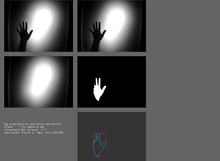openFrameworks
| Developer(s) | Zachary Lieberman, Theo Watson, Arturo Castro |
|---|---|
| Stable release | 0.9.0 / November 8, 2015 |
| Written in | C++ |
| Operating system | Mac OS X, Microsoft Windows, Linux, iOS, Android |
| Type | Application framework |
| License | MIT License |
| Website | http://openframeworks.cc/ |
openFrameworks is an open source toolkit designed for "creative coding". OpenFrameworks is written in C++ and built on top of OpenGL. It runs on Windows, Mac OS X, Linux, iOS, and Android. It is maintained by Zachary Lieberman, Theo Watson and Arturo Castro with contributions by other members of the openFrameworks community.

History
OpenFrameworks v0.01 was released by Zachary Lieberman on August 3, 2005. By February 2006, version v0.03 was in use by Lieberman's students at the Parsons School of Design, New York City. According to its authors, openFrameworks was developed:
(for) folks using computers for creative, artistic expression, and who would like low level access to the data inside of media in order manipulate, analyze or explore. That audience we felt was significantly underserved by the current crop of C++ libraries.[1]
Related projects
Its emphasis on "creative" uses draws parallels to Processing as both projects present a simplified interface to powerful libraries for media, hardware and communication. openFrameworks's main difference from Processing is that it is written in C++, instead of Java. Users will find many similarities between the two libraries, for example what is beginShape() in Processing is ofBeginShape() in openFrameworks. The openFrameworks wiki includes an article for people coming to openFrameworks from Processing.[2]
Another similar project is Cinder, which is also a C++ library framework for creative programming. The primary difference is that openFrameworks has a larger number of dependencies on open source libraries, allowing advanced programmers more control and transparency, while Cinder is more dependent on libraries built into the operating systems it sits on top of, which generally means updates and bug fixes are more frequent and reliable with openFrameworks.
License
Openframeworks is released under the MIT license. The libraries used by the framework each have their own licenses.[1]
Real world projects
Notable projects created with openFrameworks:
- graffiti analysis project by Evan Roth
- audio space by Theodore Watson
- drawn by Zach Lieberman
- colors by Cory Arcangel
- re-gaze by Chris Sugrue
- L.A.S.E.R. Tag by Theo Watson/Graffiti Research Lab
- EyeWriter by Free Art and Technology (F.A.T.), OpenFrameworks, Graffiti Research Lab, and The Ebeling Group in collaboration with TEMPTONE
- Magic Torch by Alberto García, Julio Obelleiro, Martín Nadal and Alberto Cortés
- Memento by Jeldrik Schmuch and Ulrike Gollner
- Le Sacre du Printemps is by Klaus Obermaier with the Ars Electronica Futurelab, Chris Sugrue, and Matthias Bauer.
- TouchKit Multitouch System by NOR_/D
- Quase-Cinema VJ software by Alexandre Rangel
- Globe4D by Rick Companje, Nico van Dijk, Danica Mast, Hanco Hogenbirk
- Starry Night interactive animation by Petros Vrellis
- CCV 2D Multitouch Tracking by NUI Group Community
- Super Hexagon by Terry Cavanagh
See also
- Processing - Java based application built for the electronic arts and visual design communities.
- Cinder - C++ based framework for advanced visualization capabilities.
References
External links
- openFrameworks.cc
- openFrameworks forum -- traditionally the best place for questions & announcements
- openFrameworks wiki -- documentation
- openFrameworks on GitHub -- source code